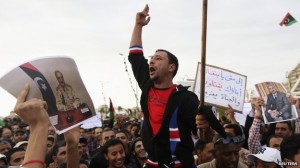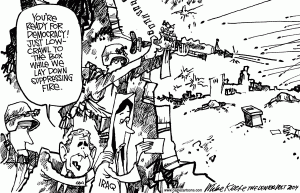Both of my bookmarks this week concerned democratization in the Middle East and the role the U.S. has played, the shortcomings in our approach thus far, and what changes need to be made to our assistance methods. My first article was by the Council on Foreign Relations, and discussed the common misconception that the only obstacle in democratic transition in the Arab world is deeply embedded Islamist roots. While this has definitely played a huge role in corrupt elections and political party alliances in Middle Eastern states resulting in failed democratic politics and further civil strife, it is not the only reason our democratic transition assistance has been less than effective. The article shows how monetary assistance in the hands of corrupt authoritarian leaders does not lead to fair democratic electoral processes or stable government institutions. It furthers in suggesting the investment in social and economic institutions rather than focusing solely on the Islamist-Secularist divide. My second bookmark from The Atlantic illuminated the same concepts with a more detailed approach. The author explains that because our methods for democratization in the Arab world has been ad-hoc and unorganized rather than large scale and long term, we need to refocus our tactics towards issues on a systematic level such as civil service, justice and law enforcement, and the military’s role in politics. I chose these articles because of our focus last week on democracy promotion across the world. In our reading from Controversies of Globalization they introduced the idea that growth “creates a favorable climate for democracy consolidation.” Instead of promoting corrupt elections and divided political parties the U.S. must assist the Arab states in reducing poverty and promoting economic growth. Doing so will reduce unemployment, stimulate economic activity as well as foreign investment, and help to combat corruption and poor governance. Prior to the establishment of a democratic government there must be a population that is ready and able to participate in it, forming the government fairly for themselves rather than struggling with one implemented by foreign powers. Democracy promotion assistance should basically shift to a “broader context,” creating stability in civil society and economic activity before trying to place an abrasively new system in the hands of authoritarian leaders.
Month: September 2014
Post-Gaddafi Libya

My two Diigo entries this week were regarding Libya’s divided political and armed groups and their competition for power, and the coalition of Arab states in the combat against ISIS. The two articles share a common theme of radical policy in the Arab world, and their lack of Political and Market Liberalism. I chose these two entries due to our focus on Libya’s history, our discussions on current ISIS events, and the various perspectives on globalization. My first article from Al Jazeera illuminated the rivalry in Libya descending from Gaddafi’s reign. After discussing the historical timeline of Gaddafi’s regime in class, it prompted me to look into how Libya is functioning currently to create a stable government. Despite the fact that Gaddafi is gone, there are still traces of his regime in tact. The General National Congress is split into two separate governments, ruling in two separate major cities, and militant rivalries in support of these distinct governments are in direct conflict with each other. External support from Arab states has transformed the conflict into a regional struggle. On the surface Libya is in support of Political and Market Liberalism, aiming to rejoin the international community in terms of multinational oil corporations. However, deeply entrenched religious and political factions have made Liberalism almost unattainable and Radicalism is still in tact from Gaddafi’s ousted regime. Exploitation of the common population still exists due to the wealthy few, and the debate over which government should take power is more so a debate on which government will allocate the state revenues to the masses more effectively. My second article was about ISIS and the Arab state coalition that is organizing to combat it. Arab states are showing a sort of Radical policy towards this coalition, asking Western powers to limit their participation to air strikes only and leave the ground fighting to the regional powers. While the Arab world strives to become more Liberal minded, they tend to remain in the radical realm, promoting national self-reliance and isolationist policies.
Hello world!
Welcome to your brand new blog at St. Edwards University Sites.
To get started, simply log in, edit or delete this post and check out all the other options available to you.
For assistance, visit our comprehensive support site, check out our Edublogs User Guide guide or stop by The Edublogs Forums to chat with other edubloggers.
You can also subscribe to our brilliant free publication, The Edublogger, which is jammed with helpful tips, ideas and more.
